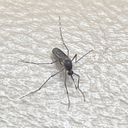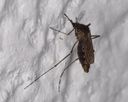Mansoniini
Mansoniini
Classification
- Phylum: Arthropoda
- Subphylum: Hexapoda
- Class: Insecta
- Order: Diptera
- Infraorder: Culicomorpha
- Family: Culicidae
- Tribe: Mansoniini
Pronunciation
How to pronounce Mansoniini: /mænˈsoʊniˌaɪnaɪ/
These audio files are automatically generated. While they are not always 100% accurate, they are a good starting point.
Images




Summary
The tribe Mansoniini contains several genera and species of mosquitoes that are predominantly found in tropical regions but may also inhabit colder regions. They play significant roles in ecosystems but can also pose health risks through disease transmission.
Physical Characteristics
Mosquitoes typically have long slender bodies, long legs, and elongated mouthparts adapted for blood-feeding.
Identification Tips
To identify species within the tribe Mansoniini, observe the physical characteristics such as size, coloration, and wing patterns, which may vary among species.
Habitat
Predominantly found in freshwater habitats such as lakes, ponds, and swamps where they lay eggs.
Distribution
This tribe is predominantly palaeotropical, with some species of the genus Mansonia extending into colder regions.
Diet
Adult mosquitoes primarily feed on nectar, but females require blood meals for egg production.
Life Cycle
The life cycle of mosquitoes typically includes four stages: egg, larva, pupa, and adult.
Reproduction
Females lay their eggs in or near water. The larvae emerge from the eggs and develop in aquatic environments.
Predators
Predators include birds, bats, and other insects that feed on adult mosquitoes or their larvae.
Ecosystem Role
Mosquito larvae serve as important prey for various aquatic organisms, while adults are essential for pollination and serve as food for predators.
Economic Impact
Mosquitoes can impact human health and agriculture due to their role in transmitting diseases.
Health Concerns
Some species in this tribe can transmit diseases, although it is primarily mosquitoes in the Anopheles and Aedes genera that are known for disease transmission.
Collecting Methods
- Light traps
- Netting
- Larval sampling
Preservation Methods
- Ethanol preservation
- Drying
- Freezing
Evolution
The tribe Mansoniini is part of the larger family Culicidae, which has a complex evolutionary history that includes adaptation to various ecological niches.
Similar Taxa
- Anophelinae
- Culicinae
Misconceptions
Not all mosquitoes transmit diseases; species identification is crucial for understanding their impact.
Tags
- Mansoniini
- Mosquitoes
- Insect Diversity
- Palaeotropical